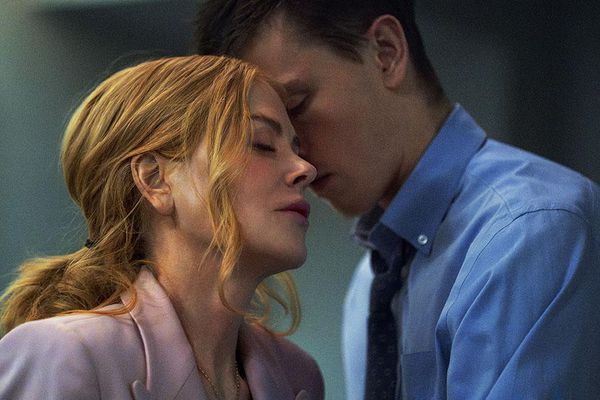Eye For Film >> Movies >> Babygirl (2024) Film Review
Babygirl
Reviewed by: Andrew Robertson

Babygirl joins a set of films that depict activities sufficiently reckless that even discussing them at work potentially invites a conversation with Human Resources. Unlike The Piano Teacher or Secretary or Videodrome there is at least a sense of awareness of consequences. It is perhaps discomfiting in light of stories like The Assistant or Sorry/Not Sorry that these seem more likely to be borne by women even here, but discomfiture is the order of the day.
It starts with needs unmet, and graphically, the balance of lap and laptop and top at the bottom of what's not working. Nicole Kidman's central performance comes in a year where big names and big roles abound, but as much as Maria is about the voice, this is the world and the flesh. Graphically, if not viscerally, in word and deed and gesture.
Romy is a CEO. Her firm is named Tensile, relating to tension, to being drawn or stretched. They do something in logistics automation, getting things people need without getting people involved. Her husband is Jacob (Antonio Banderas), a theatre director. His current work is Hedda Gabler, and in one of several internal artistic parallels he says of his protagonist that "her life is already over." He is more right than he knows.
Their daughters, Isabel (Esther McGregor) and Nora (Vaughan Reilly) are at that difficult place where age and agency are in opposition. Isabel's paramours include an Ophelia, and there are moments that recall the work of John William Waterhouse and the similarly saturated palette of Botticelli's Birth of Venus. Some of that is Titian tresses, the rest the constructedness of beauty. There's a whole suite of anagathic ablutions, from botox to cryotherapy and further through the alphabet. Time is money, and with enough of the latter one can fight the former. Not forever though, few things have that kind of span.
Testing the notion of forever, of patience, two of Romy's employees. Her aide, destined for more, Esme, played by Sophie Wilde in one of her first handful of feature roles. Proximity to power has its own difficulties, but she's more than equal to the task of working within the inequalities pictured. It's intern Samuel that will make the tensile fragile. Harris Dickinson is on the ascendant, and rightly so. In any number of moments, he and Kidman are able to perfectly balance punctured equilibria of power, dynamically modified dynamics, a give and take of take and give.
Amongst Cristobal Tapia De Veer's contributions to the soundtrack is the track Mommy's Dollhouse, and one assumes another nod to Ibsen there. Another track, Wolves, uses a vocal sample of Kidman's as part of choral instrumentation. That's much like one of his contributions to the soundtrack to Eyes Wide Shut. The more traditional aspects, animal howls aside, include an extended montage set to INXS' Never Tear Us Apart and all of George Michael's Father Figure. Significantly more recent, Yellow Claw's Crush is played in a nightclub scene at a volume that is as overwhelming as the sea of flesh beneath it.
The sets and circumstances, including that rave, all feel dead on. The upstate house, the offices, the costuming by superheroic couturiers Kurt and Bart, the kitchens, the catering. The distinction between the hotels one and another can afford. There's not a moment where the background felt off-kilter so there was always room to focus on the imbalances in the foreground.
Those are Babygirl's strength, and potentially its weakness. One could readily be prudish but at times the film seems to retreat from sex positivity, and it is telling that consequence seems to be a greater threat to the women involved. It may not be possible to have one's cake and eat it, but there are places where I'd have hoped the film would have the appetite to try. That's a complaint born of fondness. Halina Reijn's film is a rewarding piece of work, in no small part because of how it challenges its subjects and its audience.
Much as in The Shape Of Water, there's a freedom in the alien for desire. While its creature was a different class of person, the boundaries of like and unlike are as confidently drawn here. Like Titane, there's so much allusory detail behind the projections that it invites reading, especially while listening. The dance lessons are of the tarantella, all venom and ritual and allegations of Bacchanalian suppression. A moment of other dancing has the innocence and swagger of Ned Kelly and the ingenue cynicism of Saltburn.
A willingness to be messy in its explorations, to wrap itself in knots around the word 'protect', all do a credit. Though it occasionally seems hesitant, when it gets into its groove and gets stuck in, its quality dwarfs such concerns. After all, unless one is as pure as the driven snow, there's no benefit to being bashful.
Reviewed on: 10 Jan 2025














